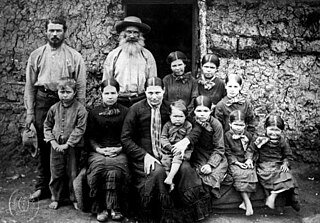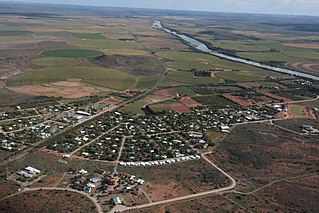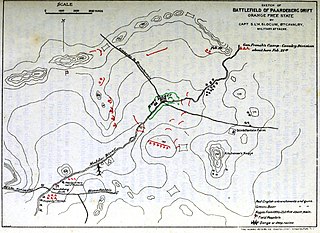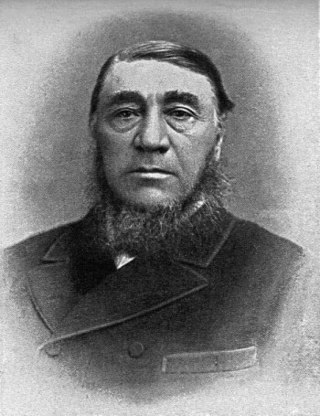
Boers ) are the descendants of the proto Afrikaans-speaking Free Burghers of the eastern Cape frontier in Southern Africa during the 17th, 18th, and 19th centuries. From 1652 to 1795, the Dutch East India Company controlled Dutch Cape Colony, but the United Kingdom incorporated it into the British Empire in 1806. The name of the group is derived from Trekboer then later "boer", which means "farmer" in Dutch and Afrikaans.

The South African Republic, also known as the Transvaal Republic, was an independent Boer republic in Southern Africa which existed from 1852 to 1902, when it was annexed into the British Empire as a result of the Second Boer War.

The Second Boer War, also known as the Boer War, the Anglo–Boer War, or the South African War, was a conflict fought between the British Empire and the two Boer Republics over the Empire's influence in Southern Africa from 1899 to 1902.

The Great Trek was a northward migration of Dutch-speaking settlers who travelled by wagon trains from the Cape Colony into the interior of modern South Africa from 1836 onwards, seeking to live beyond the Cape's British colonial administration. The Great Trek resulted from the culmination of tensions between rural descendants of the Cape's original European settlers, known collectively as Boers, and the British Empire. It was also reflective of an increasingly common trend among individual Boer communities to pursue an isolationist and semi-nomadic lifestyle away from the developing administrative complexities in Cape Town. Boers who took part in the Great Trek identified themselves as voortrekkers, meaning "pioneers", "pathfinders" in Dutch and Afrikaans.

The First Boer War, was fought from 16 December 1880 until 23 March 1881 between the United Kingdom and Boers of the Transvaal. The war resulted in a Boer victory and eventual independence of the South African Republic. The war is also known as the First Anglo–Boer War, the Transvaal War or the Transvaal Rebellion.

The Battle of Majuba Hill on 27 February 1881 was the final and decisive battle of the First Boer War that was a resounding victory for the Boers. The British Major General Sir George Pomeroy Colley occupied the summit of the hill on the night of 26–27 February 1881. Colley's motive for occupying Majuba Hill, near Volksrust, now in South Africa, may have been anxiety that the Boers would soon occupy it themselves, since he had witnessed their trenches being dug in the direction of the hill.

Joachim Johannes Ferreira was a Boer commandant of the First Boer War. This general J. Ferreira should not be confused with general I. Ferreira.

Orania is a town founded by Afrikaners. It is located along the Orange River in the Karoo region of the Northern Cape province. The town is split in two halves by the R369 road, and is 871 kilometres (541 mi) from Cape Town and approximately 680 kilometres (420 mi) from Pretoria. Its climate is semi-arid.

Christiaan Rudolf de Wet was a Boer general, rebel leader and politician.

The concept of a Volkstaat, also called a Boerestaat, is a proposed view to establish an all-White Afrikaner homeland within the borders of South Africa, most commonly proposed as a fully independent Boer/Afrikaner nation. The concept excludes Afrikaans-speaking Coloureds but accepts South Africans of English ancestry and other White South Africans, if they accept Afrikaner culture and customs.

The Battle of Paardeberg or Perdeberg was a major battle during the Second Anglo-Boer War. It was fought near Paardeberg Drift on the banks of the Modder River in the Orange Free State near Kimberley.

Afrikaner nationalism is a nationalistic political ideology created by Afrikaners residing in Southern Africa during the Victorian era. The ideology was developed in response to the significant events in Afrikaner history such as the Great Trek, the First and Second Boer Wars and opposition to South Africa's entry into World War I.

During the Napoleonic Wars, the Cape Colony was annexed by the British and officially became their colony in 1815. Britain encouraged settlers to the Cape, and in particular, sponsored the 1820 Settlers to farm in the disputed area between the colony and the Xhosa in what is now the Eastern Cape. The changing image of the Cape from Dutch to British excluded the Dutch farmers in the area, the Boers who in the 1820s started their Great Trek to the northern areas of modern South Africa. This period also marked the rise in power of the Zulu under their king Shaka Zulu. Subsequently, several conflicts arose between the British, Boers and Zulus, which led to the Zulu defeat and the ultimate Boer defeat in the Second Anglo-Boer War. However, the Treaty of Vereeniging established the framework of South African limited independence as the Union of South Africa.
Kleinfontein is a culturally segregated, Afrikaner-only settlement near Pretoria, South Africa that was founded in 1992. Members of the African National Congress and Democratic Alliance youth have denounced the settlement and the continued existence of Afrikaner-only settlements in post-Apartheid South Africa.

Afrikaners are a Southern African ethnic group descended from predominantly Dutch settlers first arriving at the Cape of Good Hope in 1652. Until 1994, they dominated South Africa's politics as well as the country's commercial agricultural sector. Afrikaners make up approximately 5.2% of the total South African population, based upon the number of White South Africans who speak Afrikaans as a first language in the South African National Census of 2011. Afrikaans, South Africa's third most widely spoken home language, evolved as the mother tongue of Afrikaners and most Cape Coloureds. It originated in the Dutch vernacular of South Holland, incorporating words brought from the Dutch East Indies and Madagascar by slaves.

The military history of Australia during the Boer War is complex, and includes a period of history in which the six formerly autonomous British Australian colonies federated to become the Commonwealth of Australia. At the outbreak of the Second Boer War, each of these separate colonies maintained their own, independent military forces, but by the cessation of hostilities, these six armies had come under a centralised command to form the Australian Army.

Kruger Day or Heroes' Day was a official public holiday in South Africa from 1882 to 1899 and again from 1952 to 1994, which celebrated annually on 10 October. The day was named after Paul Kruger, a South African politician who served as president of the South African Republic; the holiday celebrated his birthday on October 10. The day was used to underline the values and principles of the Afrikaner people.
Boerehaat is an Afrikaans word that means "ethnic hatred of Boers" or Afrikaners as they became known after the Second Boer War. The related term Boerehater has been used to describe a person who hates, prejudices or criticises Boers or Afrikaners.

Christiaan Botha was a younger brother of Louis Botha (1862–1919) and Philip Botha (1851-1901), but an older brother of Theunis Jacobus Botha (1867-1930), and likewise a Boer general in the Second Boer War (1899–1902) who then both fought the British to the end.

















